Haifeng Wen
Distributed Conformal Prediction via Message Passing
Jan 24, 2025



Abstract:Post-hoc calibration of pre-trained models is critical for ensuring reliable inference, especially in safety-critical domains such as healthcare. Conformal Prediction (CP) offers a robust post-hoc calibration framework, providing distribution-free statistical coverage guarantees for prediction sets by leveraging held-out datasets. In this work, we address a decentralized setting where each device has limited calibration data and can communicate only with its neighbors over an arbitrary graph topology. We propose two message-passing-based approaches for achieving reliable inference via CP: quantile-based distributed conformal prediction (Q-DCP) and histogram-based distributed conformal prediction (H-DCP). Q-DCP employs distributed quantile regression enhanced with tailored smoothing and regularization terms to accelerate convergence, while H-DCP uses a consensus-based histogram estimation approach. Through extensive experiments, we investigate the trade-offs between hyperparameter tuning requirements, communication overhead, coverage guarantees, and prediction set sizes across different network topologies.
NCAirFL: CSI-Free Over-the-Air Federated Learning Based on Non-Coherent Detection
Nov 20, 2024


Abstract:Over-the-air federated learning (FL), i.e., AirFL, leverages computing primitively over multiple access channels. A long-standing challenge in AirFL is to achieve coherent signal alignment without relying on expensive channel estimation and feedback. This paper proposes NCAirFL, a CSI-free AirFL scheme based on unbiased non-coherent detection at the edge server. By exploiting binary dithering and a long-term memory based error-compensation mechanism, NCAirFL achieves a convergence rate of order $\mathcal{O}(1/\sqrt{T})$ in terms of the average square norm of the gradient for general non-convex and smooth objectives, where $T$ is the number of communication rounds. Experiments demonstrate the competitive performance of NCAirFL compared to vanilla FL with ideal communications and to coherent transmission-based benchmarks.
Pre-Training and Personalized Fine-Tuning via Over-the-Air Federated Meta-Learning: Convergence-Generalization Trade-Offs
Jun 17, 2024



Abstract:For modern artificial intelligence (AI) applications such as large language models (LLMs), the training paradigm has recently shifted to pre-training followed by fine-tuning. Furthermore, owing to dwindling open repositories of data and thanks to efforts to democratize access to AI models, pre-training is expected to increasingly migrate from the current centralized deployments to federated learning (FL) implementations. Meta-learning provides a general framework in which pre-training and fine-tuning can be formalized. Meta-learning-based personalized FL (meta-pFL) moves beyond basic personalization by targeting generalization to new agents and tasks. This paper studies the generalization performance of meta-pFL for a wireless setting in which the agents participating in the pre-training phase, i.e., meta-learning, are connected via a shared wireless channel to the server. Adopting over-the-air computing, we study the trade-off between generalization to new agents and tasks, on the one hand, and convergence, on the other hand. The trade-off arises from the fact that channel impairments may enhance generalization, while degrading convergence. Extensive numerical results validate the theory.
AirFL-Mem: Improving Communication-Learning Trade-Off by Long-Term Memory
Oct 28, 2023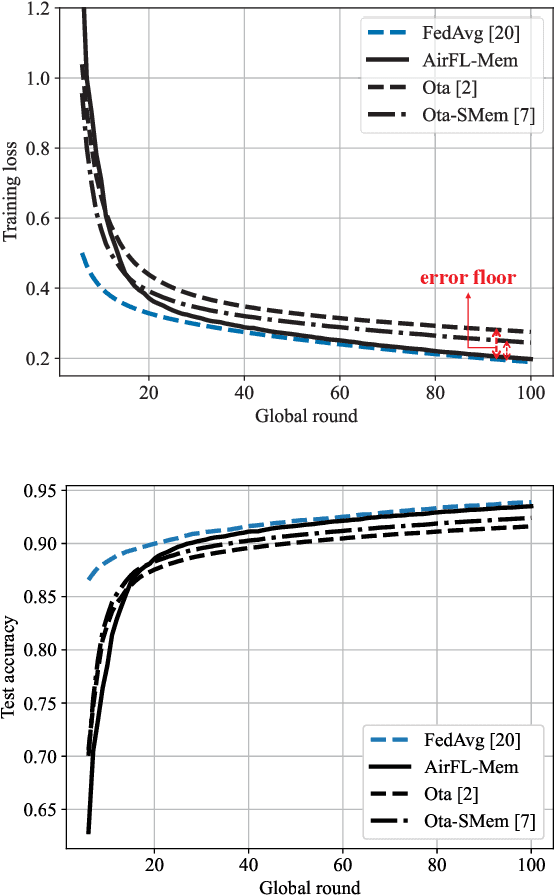
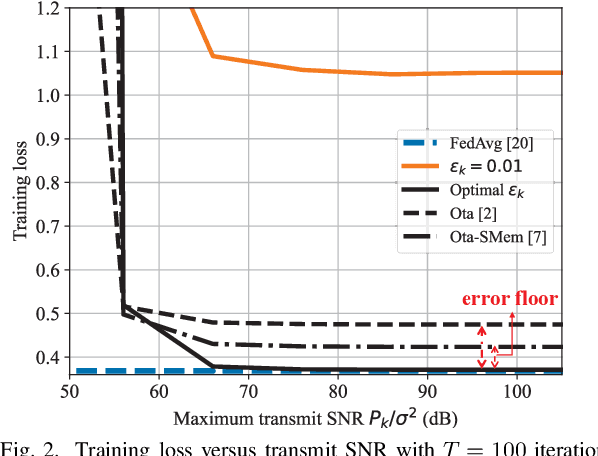
Abstract:Addressing the communication bottleneck inherent in federated learning (FL), over-the-air FL (AirFL) has emerged as a promising solution, which is, however, hampered by deep fading conditions. In this paper, we propose AirFL-Mem, a novel scheme designed to mitigate the impact of deep fading by implementing a \emph{long-term} memory mechanism. Convergence bounds are provided that account for long-term memory, as well as for existing AirFL variants with short-term memory, for general non-convex objectives. The theory demonstrates that AirFL-Mem exhibits the same convergence rate of federated averaging (FedAvg) with ideal communication, while the performance of existing schemes is generally limited by error floors. The theoretical results are also leveraged to propose a novel convex optimization strategy for the truncation threshold used for power control in the presence of Rayleigh fading channels. Experimental results validate the analysis, confirming the advantages of a long-term memory mechanism for the mitigation of deep fading.
Task-Oriented Integrated Sensing, Computation and Communication for Wireless Edge AI
Jun 11, 2023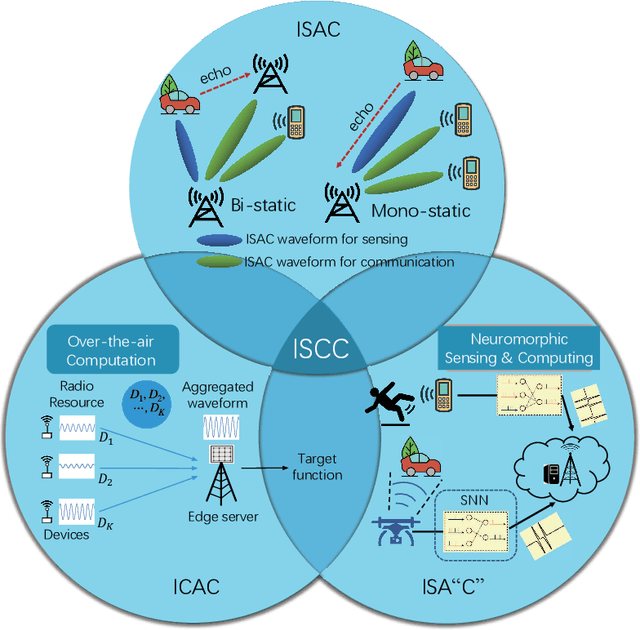
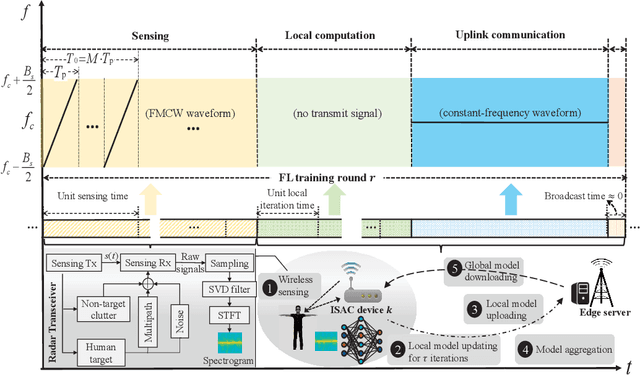
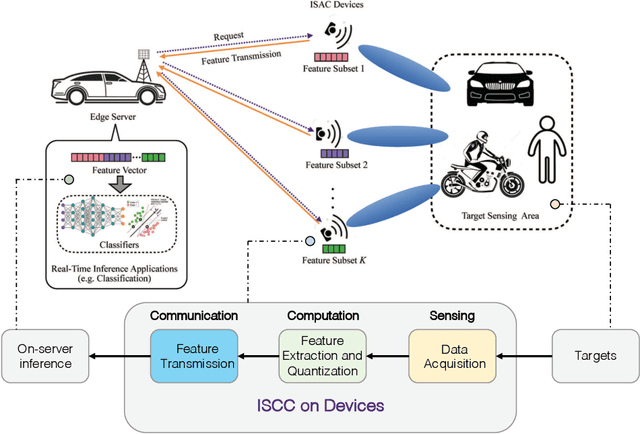
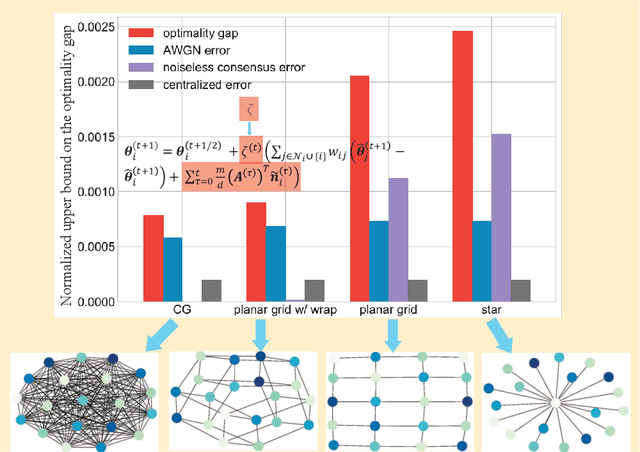
Abstract:With the advent of emerging IoT applications such as autonomous driving, digital-twin and metaverse etc. featuring massive data sensing, analyzing and inference as well critical latency in beyond 5G (B5G) networks, edge artificial intelligence (AI) has been proposed to provide high-performance computation of a conventional cloud down to the network edge. Recently, convergence of wireless sensing, computation and communication (SC${}^2$) for specific edge AI tasks, has aroused paradigm shift by enabling (partial) sharing of the radio-frequency (RF) transceivers and information processing pipelines among these three fundamental functionalities of IoT. However, most existing design frameworks separate these designs incurring unnecessary signaling overhead and waste of energy, and it is therefore of paramount importance to advance fully integrated sensing, computation and communication (ISCC) to achieve ultra-reliable and low-latency edge intelligence acquisition. In this article, we provide an overview of principles of enabling ISCC technologies followed by two concrete use cases of edge AI tasks demonstrating the advantage of task-oriented ISCC, and pointed out some practical challenges in edge AI design with advanced ISCC solutions.
Convergence Analysis of Over-the-Air FL with Compression and Power Control via Clipping
May 18, 2023Abstract:One of the key challenges towards the deployment of over-the-air federated learning (AirFL) is the design of mechanisms that can comply with the power and bandwidth constraints of the shared channel, while causing minimum deterioration to the learning performance as compared to baseline noiseless implementations. For additive white Gaussian noise (AWGN) channels with instantaneous per-device power constraints, prior work has demonstrated the optimality of a power control mechanism based on norm clipping. This was done through the minimization of an upper bound on the optimality gap for smooth learning objectives satisfying the Polyak-{\L}ojasiewicz (PL) condition. In this paper, we make two contributions to the development of AirFL based on norm clipping, which we refer to as AirFL-Clip. First, we provide a convergence bound for AirFLClip that applies to general smooth and non-convex learning objectives. Unlike existing results, the derived bound is free from run-specific parameters, thus supporting an offline evaluation. Second, we extend AirFL-Clip to include Top-k sparsification and linear compression. For this generalized protocol, referred to as AirFL-Clip-Comp, we derive a convergence bound for general smooth and non-convex learning objectives. We argue, and demonstrate via experiments, that the only time-varying quantities present in the bound can be efficiently estimated offline by leveraging the well-studied properties of sparse recovery algorithms.
OTFS-SCMA: A Downlink NOMA Scheme for Massive Connectivity in High Mobility Channels
Jan 03, 2023Abstract:This paper studies a downlink system that combines orthogonal-time-frequency-space (OTFS) modulation and sparse code multiple access (SCMA) to support massive connectivity in high-mobility environments. We propose a cross-domain receiver for the considered OTFS-SCMA system which efficiently carries out OTFS symbol estimation and SCMA decoding in a joint manner. This is done by iteratively passing the extrinsic information between the time domain and the delay-Doppler (DD) domain via the corresponding unitary transformation to ensure the principal orthogonality of errors from each domain. We show that the proposed OTFS-SCMA detection algorithm exists at a fixed point in the state evolution when it converges. To further enhance the error performance of the proposed OTFS-SCMA system, we investigate the cooperation between downlink users to exploit the diversity gains and develop a distributed cooperative detection (DCD) algorithm with the aid of belief consensus. Our numerical results demonstrate the effectiveness and convergence of the proposed algorithm and show an increased spectral efficiency compared to the conventional OTFS transmission.
 Add to Chrome
Add to Chrome Add to Firefox
Add to Firefox Add to Edge
Add to Edge